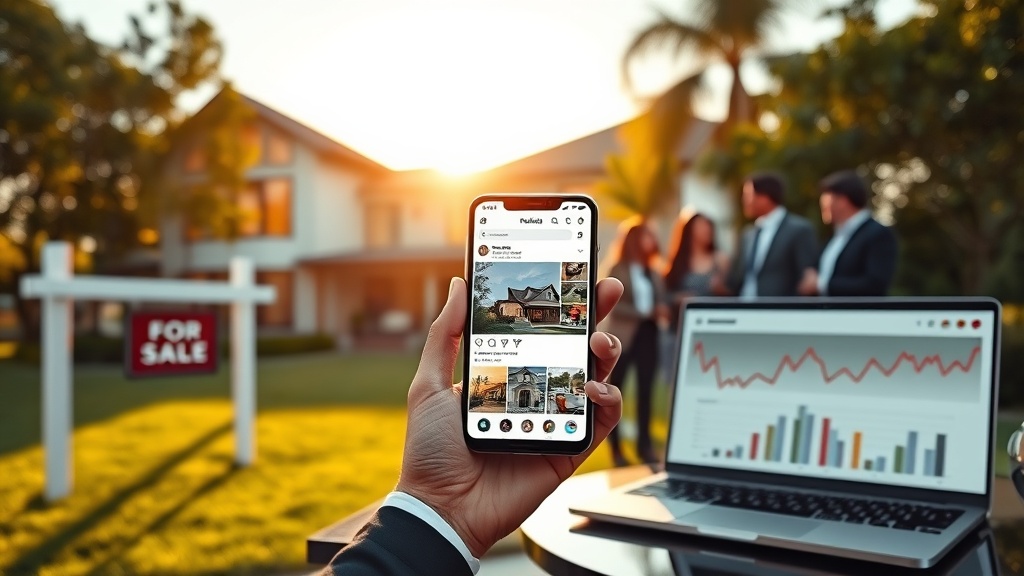How to Leverage Social Media for Real Estate Success: A Comprehensive Guide

" "
In today's digital age, social media is not just a tool for staying connected with friends and family—it's a powerhouse for business growth, particularly in real estate. With billions of active users across various platforms, social media offers unprecedented opportunities for real estate professionals to reach potential clients, showcase properties, and build their brands. This comprehensive guide will explore how real estate professionals can effectively leverage social media to achieve success.
The Evolution of Real Estate Marketing
Historical Context
Historically, real estate marketing was predominantly offline. Agents relied heavily on newspaper ads, direct mail, and open houses to attract potential buyers. The advent of the internet in the late 20th century began to change this landscape, but it was the rise of social media in the early 21st century that truly revolutionized how real estate is marketed.
Platforms like Facebook, Instagram, and LinkedIn provided real estate agents with new ways to connect with clients and showcase properties without the limitations of traditional media. These platforms offered a more interactive and engaging way to market properties, allowing real estate professionals to reach broader and more diverse audiences.
Current Trends
Today, social media platforms are integral to any comprehensive marketing strategy. Here's a look at how real estate professionals are currently using social media:
- Virtual Tours and Live Videos: Platforms such as Instagram and Facebook now allow for live streaming, giving prospective buyers virtual tours of properties from the comfort of their homes.
- Targeted Advertising: Social media platforms offer sophisticated targeting tools that allow real estate agents to reach specific demographics, ensuring that their ads are seen by those most likely to be interested in their properties.
- Community Building: Social media allows agents to build communities around their brand, creating a loyal following that can generate referrals and repeat business.
The Power of Social Media in Real Estate
Building Your Brand
Social media is a powerful tool for personal branding. By consistently sharing valuable content, real estate professionals can position themselves as experts in their field. This not only helps in attracting potential clients but also in building trust and credibility.
Real-World Scenario: Consider John, a real estate agent who specializes in luxury properties. By sharing weekly insights on market trends, property showcases, and home-buying tips on LinkedIn, he establishes himself as a thought leader in his niche. His followers view him as a go-to resource for luxury real estate, leading to increased client inquiries and referrals.
Showcasing Properties
Visual content reigns supreme on social media. Platforms like Instagram and Pinterest are ideal for showcasing high-quality images and videos of properties. The use of drones and 360-degree cameras can take visual content to the next level, offering immersive experiences that captivate potential buyers.
Real-World Scenario: Emily, a real estate agent, uses Instagram Stories to showcase different aspects of a property—highlighting its unique features, neighborhood amenities, and nearby attractions. Her engaging visual content attracts more views and inquiries, leading to quicker sales.
Engaging Your Audience
Engagement is key to social media success. Real estate professionals should actively interact with their followers by responding to comments, answering questions, and encouraging discussions. This interaction helps build relationships and fosters a sense of community.
Real-World Scenario: Sarah, a real estate broker, hosts monthly Q&A sessions on Facebook Live where she answers common questions about the home-buying process. This not only provides value to her audience but also establishes her as an approachable and knowledgeable professional.
Crafting a Winning Social Media Strategy
Define Your Goals
Before diving into social media, it's crucial to define clear goals. Are you looking to generate leads, increase brand awareness, or showcase new properties? Having specific objectives will guide your content strategy and help measure success.
Identify Your Target Audience
Understanding your target audience is essential for effective social media marketing. Consider factors such as:
- Age and Income Level: Different platforms cater to different demographics. For instance, younger audiences are more active on Instagram and TikTok, while older, more affluent buyers might be found on LinkedIn.
- Location: Tailor your content to the local market by highlighting neighborhood features, local events, and real estate trends.
- Interests and Lifestyle: Align your content with the interests of your audience. If targeting luxury buyers, focus on high-end property features, design trends, and exclusive amenities.
Choose the Right Platforms
Not all social media platforms are created equal. It's important to choose the platforms that align best with your goals and audience.
- Facebook: Ideal for building a community and running targeted ads. Facebook Groups can also be used to engage with local communities.
- Instagram: Perfect for visual storytelling and reaching a younger audience. Utilize features like Stories, IGTV, and Reels to showcase properties creatively.
- LinkedIn: Best for networking and establishing professional credibility. Share industry insights, market reports, and professional achievements.
- TikTok: Emerging as a platform for creative engagement. Use short, engaging videos to showcase properties in a fun and relatable way.
Content Creation Tips
Creating compelling content is the cornerstone of social media success. Here are some tips to ensure your content stands out:
- High-Quality Visuals: Invest in professional photography and videography to ensure your properties look their best.
- Storytelling: Use captions to tell a story about each property. Highlight unique features, historical significance, or potential lifestyle benefits.
- Consistency: Maintain a consistent posting schedule to keep your audience engaged. Use scheduling tools to plan content in advance.
- Engagement-Driven Content: Encourage interaction by asking questions, hosting polls, or running contests.
Measuring Success and Adapting
Track Key Metrics
To gauge the effectiveness of your social media strategy, it's vital to track key performance metrics:
- Engagement Rates: Monitor likes, shares, comments, and other forms of engagement to understand what content resonates with your audience.
- Follower Growth: Track the growth of your followers over time to assess brand awareness.
- Lead Generation: Use tools to track how social media is contributing to leads and conversions.
- Ad Performance: If running paid campaigns, analyze metrics such as click-through rates, conversion rates, and return on investment (ROI).
Adapt and Evolve
Social media is dynamic, with trends and algorithms constantly changing. Stay flexible and be willing to adapt your strategy based on performance data and emerging trends.
Future Implications: As technology evolves, so too will social media platforms. The integration of augmented reality (AR) and virtual reality (VR) in social media is on the horizon, offering even more immersive ways to showcase properties. Real estate professionals who stay ahead of these trends will have a competitive edge.
Overcoming Challenges
Managing Time and Resources
Social media can be time-consuming, and real estate professionals often juggle multiple responsibilities. Consider these strategies to manage your social media efforts effectively:
- Outsourcing: Hire a social media manager or agency to handle your accounts.
- Automation: Use scheduling tools to automate posts and free up time for other tasks.
- Content Repurposing: Maximize content by repurposing it across different platforms. For example, a blog post can be broken into social media posts or an infographic.
Navigating Negative Feedback
Negative comments or reviews can impact your online reputation. Address them promptly and professionally:
- Acknowledge: Respond to negative feedback by acknowledging the issue.
- Apologize: Offer a sincere apology if necessary and provide a solution.
- Take it Offline: Encourage further communication via private messages or email to resolve issues.
Conclusion
Leveraging social media for real estate success is no longer optional—it's essential. By building a strong brand, engaging your audience, creating compelling content, and adapting to trends, real estate professionals can harness the power of social media to achieve their business goals. As the digital landscape continues to evolve, those who embrace these strategies will be well-positioned to thrive in the competitive world of real estate. So, start crafting your social media strategy today and watch your real estate business soar to new heights!











